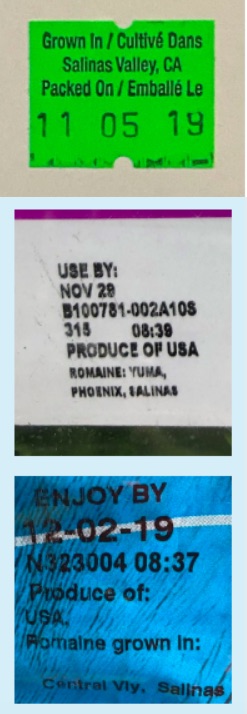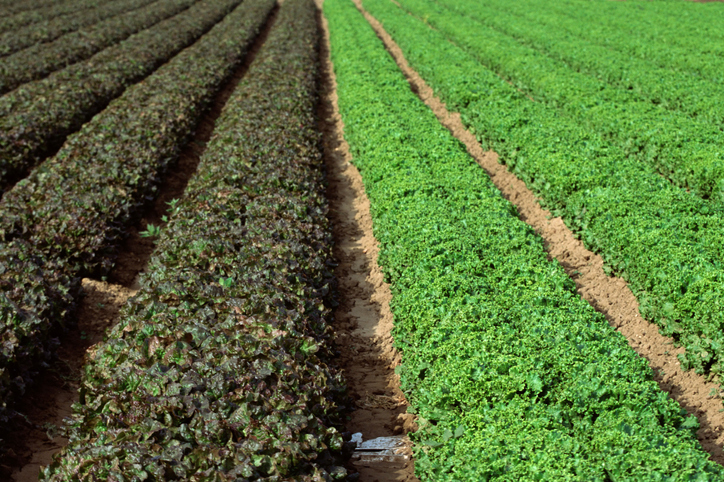A public health alert about E. coli in romaine lettuce grown in Salinas, CA has triggered a mishmash of responses from stores, restaurants and growers. The alert, which includes whole heads of romaine, hearts of romaine, chopped romaine, salad kits, wraps and other products, (except those grown in hothouses) is linked to an E. coli outbreak that has sickened 40 people and follows an extensive recall of prepackaged salad products.
The outbreak, which has been rapidly growing since it was announced last week now includes 40 illnesses in 16 states. Twenty-eight people have been hospitalized, five of them have hemolytic uremic syndrome (HUS) a form of kidney failure that is a complication of E. coli infections.

The E. coli outbreak is fourth to be linked to romaine in the last two years. And the third in the last three years that, according to the results of genetic tests, appears to be caused by the same strain of E. coli O157: H7, the Centers for Disease Control and Prevention (CDC) has stated. The two previous outbreaks occurred at the same time of year, one in 2017 linked to leafy greens and one in 2018, linked to romaine.
There was one romaine outbreak between those two. One linked to romaine lettuce grown in Yuma, AZ that sickened more than 200 people, killing five of them. Health officials said they could only narrow the source of the outbreak to a growing region – Yuma, AZ, not a specific grower. So, they issued an alert warning consumers to avoid romaine grown in that area. The problem was, not many brands included that information on their labels. Some stores and restaurants posted information about actions the had taken to address the problem, others didn’t. Likewise, some growers posted information on their websites saying their products hadn’t been implicated. Others didn’t. Consumers were confused and frustrated.
So, when another romaine E. coli outbreak occurred a few months after that, the 2018 outbreak that appears to be linked to this one, and again officials could not sufficiently narrow down the source, the CDC acted decisively issuing a public health alert, almost exactly one year ago, warning consumers to throw away all romaine lettuce. Growers were infuriated.
About a week later, another announcement. The growing area had been narrowed down to California’s Central Coast region and consumers should only avoid romaine from that area. But labels still lacked that information and stores and restaurants all responded differently. Consumers were again confused and frustrated.
And, spoiler alert, here we are again. Another romaine E. coli outbreak that can only be narrowed down to a growing region. Another mishmash of responses and a whole lot of frustrated consumers.
Shoppers who are buying whole heads of romaine, bagged chopped romaine or bagged hearts of romaine, may find harvest area information on the package or twist tie like the images shown above. But what if you’re dining out, you’re supposed to avoid romaine unless the restaurant specifies that its products were grown elsewhere.
So, on Target’s website, consumers will find a long list of recalled products associated with this outbreak, recall and health alert. A posting on Trader Joe’s website says all affected product has been pulled from shelves. But there is no mention of the public health alert on the websites of Whole Foods, or Kroger.
Likewise with restaurants. The websites of McDonald’s and Subway make no mention of the alert, while Panera’s website letting consumers know about they are aware of the alert, have removed, all affected product from their stores and is serving only romaine grown in other areas.
Growers, too, have had different responses. Dole, Fresh Express and Organic Girl websites do not mention the alert. Taylor Farms and Earthbound Farms websites have statements saying they are aware of the public health alert, have no indication that their products are implicated and recommend consumers follow the CDC’s advice. Three kosher growers told Hamodia that their products are not affected by the health alert.
Until there is more information from the CDC, consumers should only eat romaine lettuce that they know was not grown in Salinas.
The E. coli lawyers at Pritzker Hageman are representing several people sickened in this outbreak including US including a 14-year-old girl in Wisconsin with HUS. For a free consultation with our E. coli Team, call us at 1-888-377-8900, text us at 612-261-0856 or, fill out the form below.
